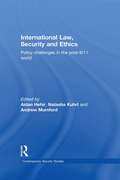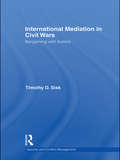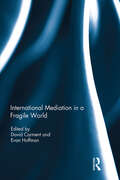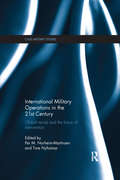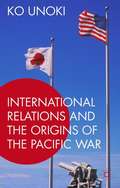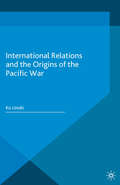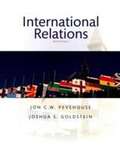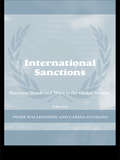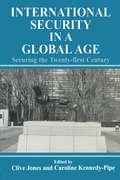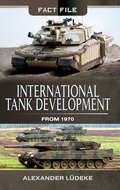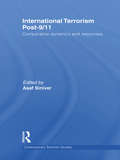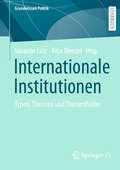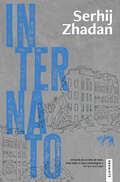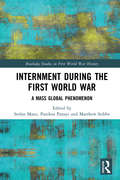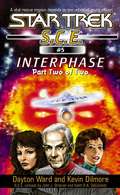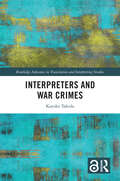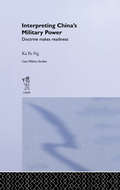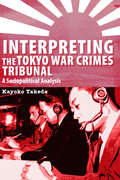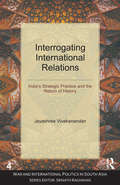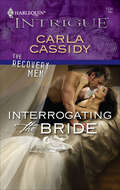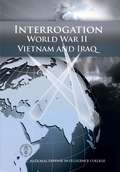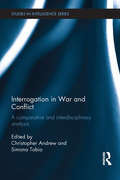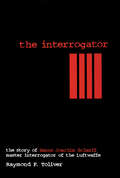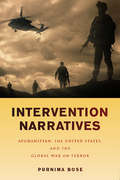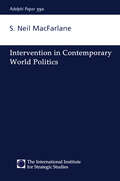- Table View
- List View
International Law, Security and Ethics: Policy Challenges in the post-9/11 World (Contemporary Security Studies)
by Aidan Hehir Andrew Mumford Natasha KuhrtThis book examines the different ways in which the laws governing the use of force and the conduct of warfare have become subject to intense scrutiny and contestation since the initiation of the war on terror. Since the end of the Cold War, the nature of security challenges has changed radically and this change has been recognised by the UN, governments and academics around the world. The 911 attacks and the subsequent launch of the 'war on terror' added a new dimension to this debate on the nature and utility of international law due to the demands from some quarters for a change in the laws governing self-defence and humanitarian intervention. This book analyses the nature of these debates and focuses on key issues that have led to the unprecedented contemporary questioning of both the utility and composition of international law on the use of force as well as the practicability of using force, including handling of ‘prisoners’ and ‘security risks’. It also identifies the sources of division and addresses the capacities of security policy and international law to adapt to the changed international environment. This book will of much interest to students of international law, war and conflict studies, and IR and Security Studies in general.
International Mediation in Civil Wars: Bargaining with Bullets (Routledge Studies in Security and Conflict Management)
by Timothy D SiskThis book evaluates the role of international mediators in bringing civil wars to an end and makes the case for ‘powerful peacemaking’ – using incentives and sanctions – to leverage parties into peace. As internal violence within countries is a hugely significant threat to international peace in the post-Cold War era, the question of how these wars end has become an urgent research and policy question. This volume explores a critical aspect of peacemaking that has yet to be sufficiently evaluated: the turbulent period beyond the onset of formal or open negotiations to end civil wars and the clinching of an initially sustainable negotiated settlement. The book argues that the transnational flow of weapons, resources, and ideas means that when civil wars today end, they are more likely to do so at the negotiating table than on the battlefield. It uses bargaining theory to develop an analytical framework to evaluate peace processes – moving from stalemate in wars to negotiated settlement – and it rigorously analyses the experiences of five cases of negotiated transitions from war and the role of international mediators: South Africa, Liberia, Burundi, Kashmir, and Sri Lanka.
International Mediation in a Fragile World
by David Carment and Evan HoffmanContributions to this volume consider the importance of mediation in violent conflict. Practical and applied, this publication will be of interest to scholars, academics, policymakers and practitioners. It was originally published as a special issue of Canadian Foreign Policy Journal.
International Military Operations in the 21st Century: Global Trends and the Future of Intervention (Cass Military Studies)
by Per M. Norheim-Martinsen Tore NyhamarThis book examines the challenges that military forces will face in multinational operations in the 21st century. Expanding on Rupert Smith’s The Utility of Force, the volume assesses the changing parameters within which force as a political instrument is ultimately carried out. By analysing nine carefully selected mission types, the volume presents a comprehensive analysis of key trends and trajectories. Building upon this analysis, the contributors break the trends and parameters down into real and potential tasks and mission types in order to identify concrete implications for military forces in future multinational operations. The context of military intervention in conflicts and crises around the world is rapidly evolving. Western powers’ shrinking ability and desire to intervene makes it pertinent to analyse how the cost of operations can be reduced and, how they can be executed more intelligently in the future. New challenges to international military operations are arising and this book addresses these challenges by focusing on three key areas of change: 1) An increasingly urbanised world; 2) The changing nature of missions; 3) The commercial availability of new technologies. In answering these questions and embracing some of the insights of a growing field of future studies, the volume presents an innovative perspective on future international military operations. This book will be of much interest to students of international intervention, military and strategic studies, war and conflict studies, security studies and IR in general.
International Relations and the Origins of the Pacific War
by Ko UnokiInternational Relations and the Origins of the Pacific War takes the unique approach of examining the history of the relationship between Japan and the United States by using the framework of international relations theories to search for the origins of the Pacific War, that erupted with Japan's attack on Pearl Harbour in 1941.
International Relations and the Origins of the Pacific War
by Ko UnokiInternational Relations and the Origins of the Pacific War takes the unique approach of examining the history of the relationship between Japan and the United States by using the framework of international relations theories to search for the origins of the Pacific War, that erupted with Japan's attack on Pearl Harbour in 1941.
International Relations, Eleventh Edition
by Joshua S. Goldstein Jon C. W. PevehouseInternational Relations enables readers to form a framework for analyzing the complex and constantly changing information that comprises our increasingly interconnected world. Opening readers’ eyes to the positive and negative events that occur across the globe every day, authors Jon Pevehouse and Joshua Goldstein offer a strong foundation in current global affairs, with insight into topics like foreign assistance in the developing world, the changing nature of war, and global poverty levels. <P><P>The Eleventh Edition explores themes of international relationships from economic, social, and political standpoints. Through human scale stories that touch on broader themes such as war and peace, humans and their environment, poverty and development, and more, the book provides readers with relatable material to understand international relations.
International Sanctions: Between Wars and Words (Cass Series on Peacekeeping #Vol. 21)
by Peter Wallensteen Carina StaibanoThe main theme of the book is that the new types of sanctions constitute a challenge to the international system. First, there are more of the targeted sanctions, including financial, travel, aviation, special commodity and arms sanctions. Furthermore, there are considerable but varied practices in implementation. Also there are now sanctions by new actors (regional bodies, international organizations). These all put new strains on international bodies in carrying out sanctions or getting member states to work together in these efforts. These challenges are analyzed in this volume, with some examples, but mostly from a generalist perspective. A completely novel aspect is that this volume also includes studies of the difficulties that are met by targeting actors, their way of managing the situations, and most interesting, the human rights of such actors.
International Security Issues in a Global Age: Securing the Twenty-first Century
by Clive JonesThis volume examines the new, the changing, and the enduring features of international security in the post-Cold War era. In so doing, it examines the extent to which present state structures and institutions have been able to adapt and accommodate themselves to the diversity of security threats.
International Tank Development From 1970 (Fact File)
by Alexander LudekeA great upheaval in tank construction took place in the 1970s, as new combat techniques, helicopters, weaponry and new types of ammunition reduced the value of a conventional combat battalion. Nevertheless, complete new developments are rare and in this book, Alexander Ldeke looks at the most important developments that have taken place since 1970.
International Terrorism Post-9/11: Comparative Dynamics and Responses (Contemporary Terrorism Studies)
by Asaf SiniverThis edited volume brings together both western and non-western approaches to counter-terrorism in the post-9/11 era. This multi-cultural study of counter-terrorism strategies identifies common lessons from failed and successful attempts to counter the terrorist threat and provides guidelines for an effective counter-terrorism strategy. The book explores the changing dynamics of terrorism from a range of perspectives – from the global threat posed by home-grown terrorism in North Africa and the larger security dimensions in the Middle East, to the various strategies employed by western and non-western societies in their efforts to develop effective counter-terrorism strategies. Core themes in the book include the divergent dynamics of the phenomena categorised under the 'terrorism' label, and the domestic, national and regional variants of international terrorism. As such, the book offers in-depth analysis of the relationship between the local and the global, both in the root causes of, and responses to, terrorism since 9/11. This book will be of much interest to students of terrorism and political violence, security studies and IR. Asaf Siniver is Lecturer in International Security in the Department of Political Science and International Studies at the University of Birmingham.
Internationale Institutionen: Typen, Theorien und Themenfelder (Grundwissen Politik)
by Susanne Lütz Anja MenzelInstitutionen spielen eine zentrale Rolle bei der Kooperation und Konfliktregelung in der internationalen Politik. Sie beschränken oder ermöglichen bestimmte Verhaltensweisen und tragen dadurch zur Bearbeitung grenzüberschreitender Probleme bei. Dieses Lehrbuch führt in die theoriegeleitete Analyse der Entstehung und Funktionsweise verschiedener institutioneller Arrangements ein, in denen Staaten teils miteinander, teils mit privaten Akteuren grenzüberschreitend kooperieren. Behandelt werden Verhandlungen, Regime, Regimekomplexe und Formen transnationalen Regierens. Studierende der Politikwissenschaft erhalten einen analytischen und theoretischen Handwerkskasten für die Institutionenanalyse. Fallstudien aus den Politikfeldern Sicherheit, Wirtschaft, Handel, Finanzen, Umwelt und Wohlfahrt veranschaulichen die theoriegeleitete Analyse von Institutionen und vermitteln Studierenden Kompetenzen für die Durchführung eigener Studien.
Internato
by Serhij ZhadanPrémio Hannah Arendt 2022 Prémio EBRD 2022 Uma obra literária que captura o espírito do tempo, escrita por um autor de culto para uma inteira geração. Uma viagem de sobrevivência numa cidade do leste da Ucrânia transformada em palco de guerra.Um jovem professor procura trazer para casa o seu sobrinho de treze anos que se encontra num internato. Terá para isso de cruzar a cidade. Uma aventura perigosa de ida e volta, que durará um dia inteiro. A cidade está transformada num cenário de guerra e a escola um dos seus epicentros. Com uma arte narrativa, descrita pela crítica como «Jazz verbal», que transforma palavras em poderosas imagens, Zhadan descreve com rigor e inesperada poesia como a guerra transforma uma paisagem outrora familiar numa realidade apocalíptica, onde a destruição e o medo imperam. Os elogios da crítica: «Porventura mais do que qualquer outro escritor da era pós-soviética, Serhij Zhadan aborda a experiência da convulsão nacional e pessoal.» — The Times Literary Supplement «Internato é uma pequena obra-prima.» — Literatur Spiegel«O bardo da Ucrânia de leste, onde tudo se está a desintegrar.» — The New York Times «Zhadan tece as suas palavras — subtis, dolorosas, acutilantes — com um sentido delicado da melodia.» — Die Zeit «Neste romance, o talento literário de Serhij Zhadan brilha como uma estrela sobre a paisagem urbana pintada pelo silêncio e pelo rumor da guerra.» — Literary Hub«Um romance que permitirá ao leitor sentir o cheiro da guerra.» — SRF «Com o sentido lírico de um poeta, Zhadan revela sem pejo um país devastado e um povo determinado a sobreviver.» — Publishers Weekly
Internment during the First World War: A Mass Global Phenomenon (Routledge Studies in First World War History)
by Panikos Panayi Matthew Stibbe Stefan ManzAlthough civilian internment has become associated with the Second World War in popular memory, it has a longer history. The turning point in this history occurred during the First World War when, in the interests of ‘security’ in a situation of total war, the internment of ‘enemy aliens’ became part of state policy for the belligerent states, resulting in the incarceration, displacement and, in more extreme cases, the death by neglect or deliberate killing of hundreds of thousands of people throughout the world. This pioneering book on internment during the First World War brings together international experts to investigate the importance of the conflict for the history of civilian incarceration.
Interphase Book 2
by Dayton Ward Kevin DilmoreWith Captain David Gold and an away team trapped on the other side of an interdimensional rift, Lieutenant Commander Kieran Duffy Þnds himself in command of the U.S.S. da Vinci just as the ship comes under attack by the Tholians. The enemy is armed with a new and improved version of their infamous energy web, and the da Vinci is badly outnumbered, but þeeing the battle means abandoning the captain and the others to an uncertain fate outside this universe. There, marooned aboard a derelict vessel, Gold and his S.C.E. team struggle to keep the madness -- inducing effect of the rift from driving them to suicide and murder before they can Þnd a way to escape the realm of Interphase. The exciting conclusion of an all-new two-part adventure!
Interpreters and War Crimes (Routledge Advances in Translation and Interpreting Studies)
by Kayoko TakedaTaking an interdisciplinary approach, this book raises new questions and provides different perspectives on the roles, responsibilities, ethics and protection of interpreters in war while investigating the substance and agents of Japanese war crimes and legal aspects of interpreters’ taking part in war crimes. Informed by studies on interpreter ethics in conflict, historical studies of Japanese war crimes and legal discussion on individual liability in war crimes, Takeda provides a detailed description and analysis of the 39 interpreter defendants and interpreters as witnesses of war crimes at British military trials against the Japanese in the aftermath of the Pacific War, and tackles ethical and legal issues of various risks faced by interpreters in violent conflict. The book first discusses the backgrounds, recruitment and wartime activities of the accused interpreters at British military trials in addition to the charges they faced, the defence arguments and the verdicts they received at the trials, with attention to why so many of the accused were Taiwanese and foreign-born Japanese. Takeda provides a contextualized discussion, focusing on the Japanese military’s specific linguistic needs in its occupied areas in Southeast Asia and the attributes of interpreters who could meet such needs. In the theoretical examination of the issues that emerge, the focus is placed on interpreters’ proximity to danger, visibility and perceived authorship of speech, legal responsibility in war crimes and ethical issues in testifying as eyewitnesses of criminal acts in violent hostilities. Takeda critically examines prior literature on the roles of interpreters in conflict and ethical concerns such as interpreter neutrality and confidentiality, drawing on legal discussion of the ineffectiveness of the superior orders defence and modes of individual liability in war crimes. The book seeks to promote intersectoral discussion on how interpreters can be protected from exposure to manifestly unlawful acts such as torture.
Interpreting China's Military Power: Doctrine Makes Readiness (Cass Military Studies)
by Ka Po NgAlthough inter-state tensions have generally been easing after the Cold War, military power remains a dominant factor in Asian regional politics. As China, operating the world's largest army, grows stronger, there are ongoing debates over the implications for Asia's regional security. This book argues that it is imperative to look beyond the empirical observations and conventional materialist reading of Chinese military development to understand its dynamics and directions in doctrinal terms and put it in a readiness context for evaluation. Military doctrine has long been under-studied and is often treated as a subject separate from force development. But, as this study contends, this factor is necessary for interpreting the making and purposes of China's military power because it forms the intellectual foundation of military structural and hardware development. When loaded with political rhetoric, it also communicates to us the intended uses of the military power. The role of doctrine is reinforced in the context of military readiness, which defines what for and how the army is getting ready. Force development is evaluated in structural, operational and directional terms.The importance of this analytical framework based on military doctrine and readiness is demonstrated in a survey of the evolutionof Chinese military doctrine and force development. As the Chinese People's Liberation Army has continued to adjust its military structure and operation to follow the doctrinal lead, its switches between the doctines of local war and total war have seen corresponding changes to the emphasis between operational and structural readiness.
Interpreting the Tokyo War Crimes Tribunal: A Sociopolitical Analysis (Perspectives on Translation)
by Kayoko TakedaIn order to ensure its absolute authority, the Tokyo War Crimes Tribunal (1946–1948), the Japanese counterpart of the Nuremberg Trial, adopted a three-tier structure for its interpreting: Japanese nationals interpreted the proceedings, second-generation Japanese-Americans monitored the interpreting, and Caucasian U.S. military officers arbitrated the disputes. The first extensive study on the subject in English, this book explores the historical and political contexts of the trial as well as the social and cultural backgrounds of the linguists through trial transcripts in English and Japanese, archival documents and recordings, and interviews with those who were involved in the interpreting. In addition to a detailed account of the interpreting, the book examines the reasons for the three-tier system, how the interpreting procedures were established over the course of the trial, and the unique difficulties faced by the Japanese-American monitors. This original case study of the Tokyo War Crimes Tribunal illuminates how complex issues such as trust, power, control and race affect interpreting at international tribunals in times of conflict.
Interrogating International Relations: India's Strategic Practice and the Return of History (War and International Politics in South Asia)
by Jayashree VivekanandanThe book interrogates the disciplinary biases and firewalls that inform mainstream international relations today, and problematises the several tropes that have come to typify the strategic histories of post-colonial societies such as India. Questioning a range of long-held cultural representations on India, the book challenges such portrayals and underscores the centrality of context and contingency in any cultural explanation of state behaviour. It argues for a historico-cultural understanding of power and critiques IR’s tendency to usher in a selective ‘return of history’. Taking two contrasting case studies from medieval Indian history, the book assesses the success and failure of the grand strategy pursued by the Mughal empire under Akbar. The study emphasises his grand strategy of accommodation, defined by the interplay of critical variables such as distance and the vast military labour market. The book also looks at his conscious attempt to indigenise power by projecting himself as the personification of the ideal Hindu king. This case study helps to contextualise the many critical transitions that occurred in international relations: from medieval empires to the modern state system, and from an indigenised, experiential understanding of power to its absolute, abstract manifestations in the colonial state.
Interrogating the Bride (The Recovery Men #1)
by Carla CassidyFormer navy SEAL Micah Stone could spot danger a mile away. And the alluring bride who'd stowed away on the plane he'd been sent to repossess set off every red flag in the book. Caylee Warren claimed she had nothing to do with her "fiancé's" murder. When it began to look as if Caylee was the intended victim, Micah had no choice but to take her into hiding. But for a man who never let anyone get close, protecting Caylee was more than he could handle. Could he let her break down the walls he'd erected around his heart...even if it meant distracting him from the mission at hand?
Interrogation World War II, Vietnam, And Iraq: World War Ii, Vietnam, And Iraq
by James A. Stone David P. Shoemaker Major Nicholas R. DottiIn September 2004, the Intelligence Science Board, an advisory board appointed by the Director of National Intelligence, initiated the Study on Educing Information (EI). This study is an ongoing effort to review what is known scientifically about interrogation and other forms of human intelligence collection and to chart a path to the future.As part of our efforts, we have worked closely with faculty and students of the National Defense Intelligence College. The NDIC Press published Educing Information: Interrogation: Science and Art, Foundations for the Future, a book based on Phase I of the Study on EI. Three students, Special Agent James Stone, U.S. Air Force; Special Agent David Shoemaker, U.S. Air Force; and Major Nicholas Dotti, U.S. Army, completed master's thesis studies during Academic Year 2006-07 on topics related to interrogation. Each thesis is a remarkable and useful document.Special Agent Stone researched U.S. efforts during World War II to develop language and interrogation capacities to deal with our Japanese enemy. He found that military leaders, often working with civilian counterparts, created and implemented successful strategies, building on cultural and linguistic skills that substantially aided the war effort for the U.S. and its Allies.Special Agent Shoemaker studied the experiences of three successful interrogators during the Vietnam War. Like S/A Stone, S/A Shoemaker suggests that policymakers and practitioners have much to learn from professionals who served effectively for years in the field educing information. And like Stone, Shoemaker highlights the importance of a deep understanding of the language, psychology, and culture of adversaries and potential allies in other countries.
Interrogation in War and Conflict: A Comparative and Interdisciplinary Analysis (Studies in Intelligence)
by Christopher Andrew Simona TobiaThis edited volume offers a comparative and interdisciplinary analysis of interrogation and questioning in war and conflict in the twentieth century. Despite the current public interest and its military importance, interrogation and questioning in conflict is still a largely under-researched theme. This volume’s methodological thrust is to select historical case studies ranging in time from the Great War to the conflicts in former Yugoslavia, and including the Second World War, decolonization, the Cold War, the ‘Troubles’ in Northern Ireland and international justice cases in The Hague, each of which raises interdisciplinary issues about the role of interrogation. These case-studies were selected because they resurface previously unexplored sources on the topic, or revisit known cases which allow us to analyse the role of interrogation and questioning in intelligence, security and military operations. Written by a group of experts from a range of disciplines including history, intelligence, psychology, law and human rights, Interrogation in War and Conflict provides a study of the main turning points in interrogation and questioning in twentieth-century conflicts, over a wide geographical area. The collection also looks at issues such as the extent of the use of harsh techniques, the value of interrogation to military intelligence, security and international justice, the development of interrogation as a separate profession in intelligence, as well as the relationship between interrogation and questioning and wider society. This book will be of much interest to students of intelligence studies, strategic studies, counter-terrorism, international justice, history and IR in general.
Interrogator: The Story of Hanns-Joachim Scharff, Master Interrogator of the Luftwaffe (Schiffer Military History History)
by Raymond F. ToliverThe story of Hanns Scharff, Nazi Germany&’s master interrogator who questioned American POWs with subtle, startlingly effective tactics. During World War II, German Intelligence Officer Hanns Scharff gained the reputation as the man who could magically get all the answers he needed from a prisoner of war. In most cases, the POWs being interrogated never realized that their words, small talk or otherwise, were important pieces of the mosaic Scharff was constructing. He was so effective that the USAF invited him to speak about his methods to military audiences in the United States after World War II. In the words of one former POW, &“What did Scharff get from me? Nothing, yet there is no doubt he got something. If you talked about the weather or anything else, he no doubt got some information or confirmation from it. His technique was psychic, not physical.&” Another POW commented, &“Hanns Scharff could probably get a confession of infidelity from a Nun!&” To this day, ex-POWs fret over what they said or even might have implied during their interrogations, and over what use Scharff may have made of their slip-ups. This book delves into the question: What magic formula did Scharff use to draw information out of servicemen trained to remain silent?
Intervention Narratives: Afghanistan, the United States, and the Global War on Terror (War Culture)
by Purnima BoseIntervention Narratives examines the contradictory cultural representations of the US intervention in Afghanistan that help to justify an imperial foreign policy. These narratives involve projecting Afghans as brave anti-communist warriors who suffered the consequences of American disengagement with the region following the end of the Cold War, as victimized women who can be empowered through enterprise, as innocent dogs who need to be saved by US soldiers, and as terrorists who deserve punishment for 9/11. Given that much of public political life now involves affect rather than knowledge, feelings rather than facts, familiar recurring tropes of heroism, terrorism, entrepreneurship, and canine love make the war easier to comprehend and elicit sympathy for US military forces. An indictment of US policy, Bose demonstrates that contemporary imperialism operates on an ideologically diverse cultural terrain to enlist support for the war across the political spectrum.
Intervention in Contemporary World Politics: Intervention In Contemporary World Politics (Adelphi series)
by Neil MacfarlaneExamines multilateral interventions in civil conflicts and the evolution of the role of such interventions in world politics. It focuses primarily on the Cold War and post-Cold War eras and the differences between them. It contests the notion that there is an emerging norm of humanitarian intervention in international politics, arguing that political interests remain essential to the practice of intervention.
